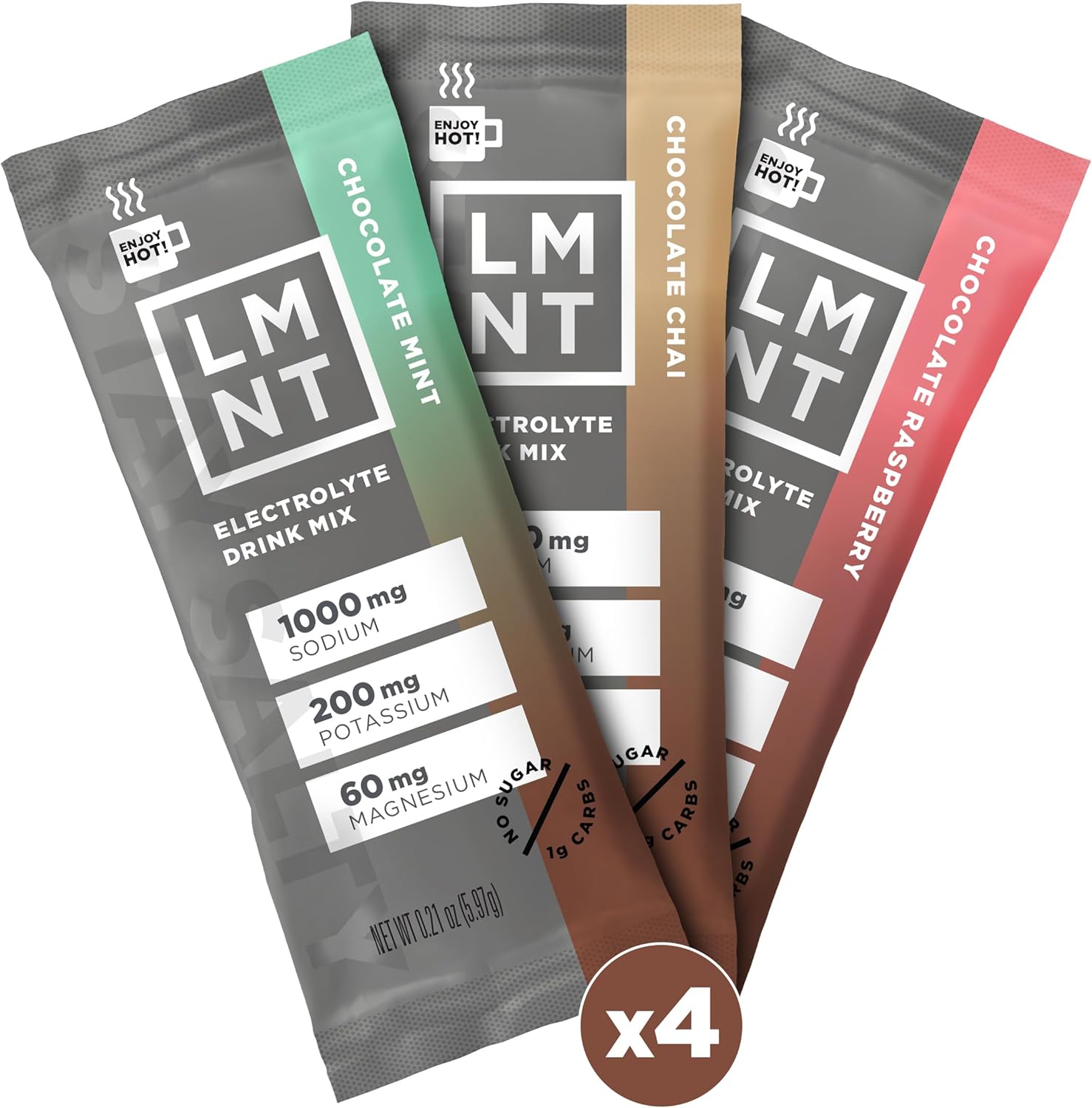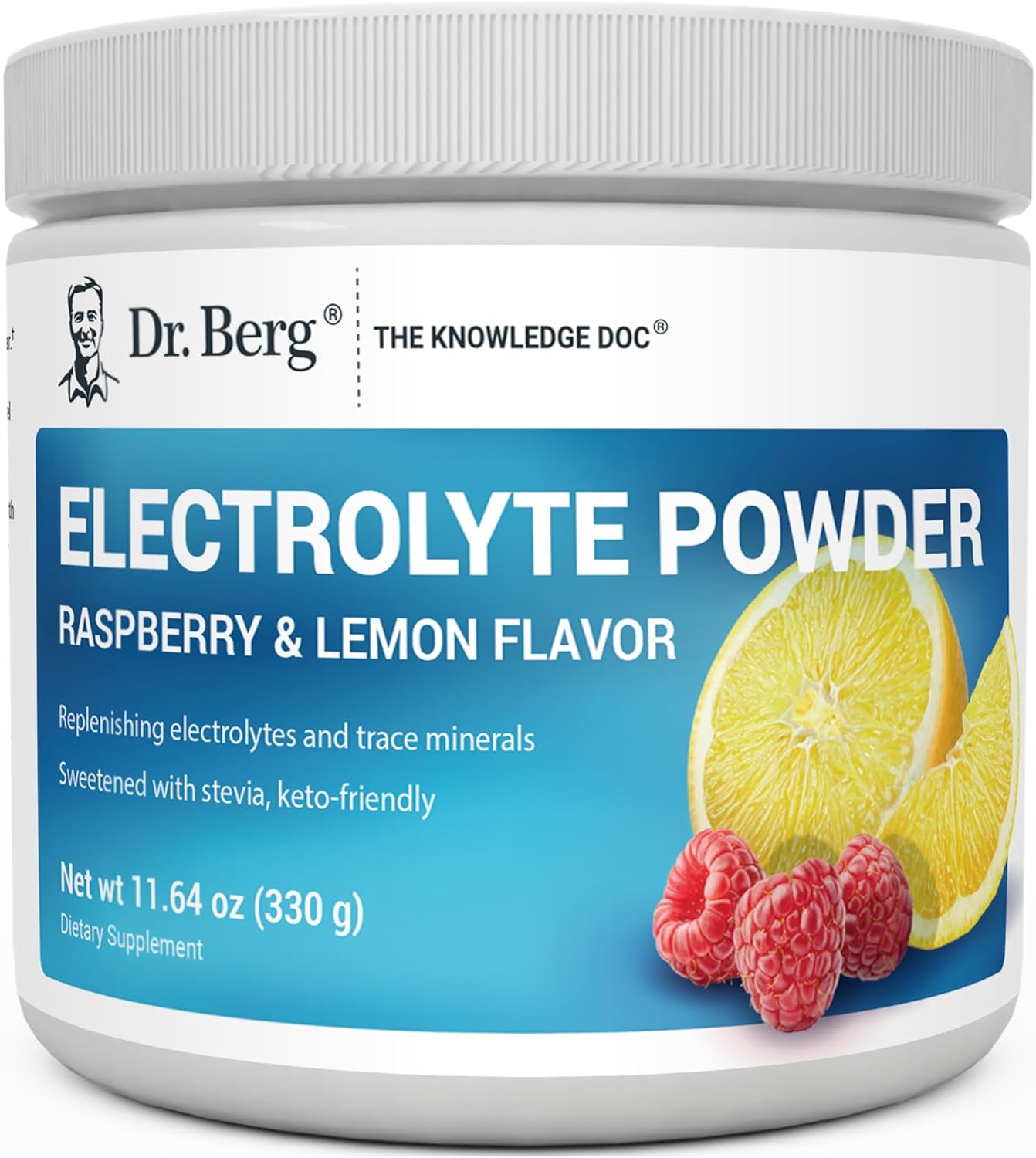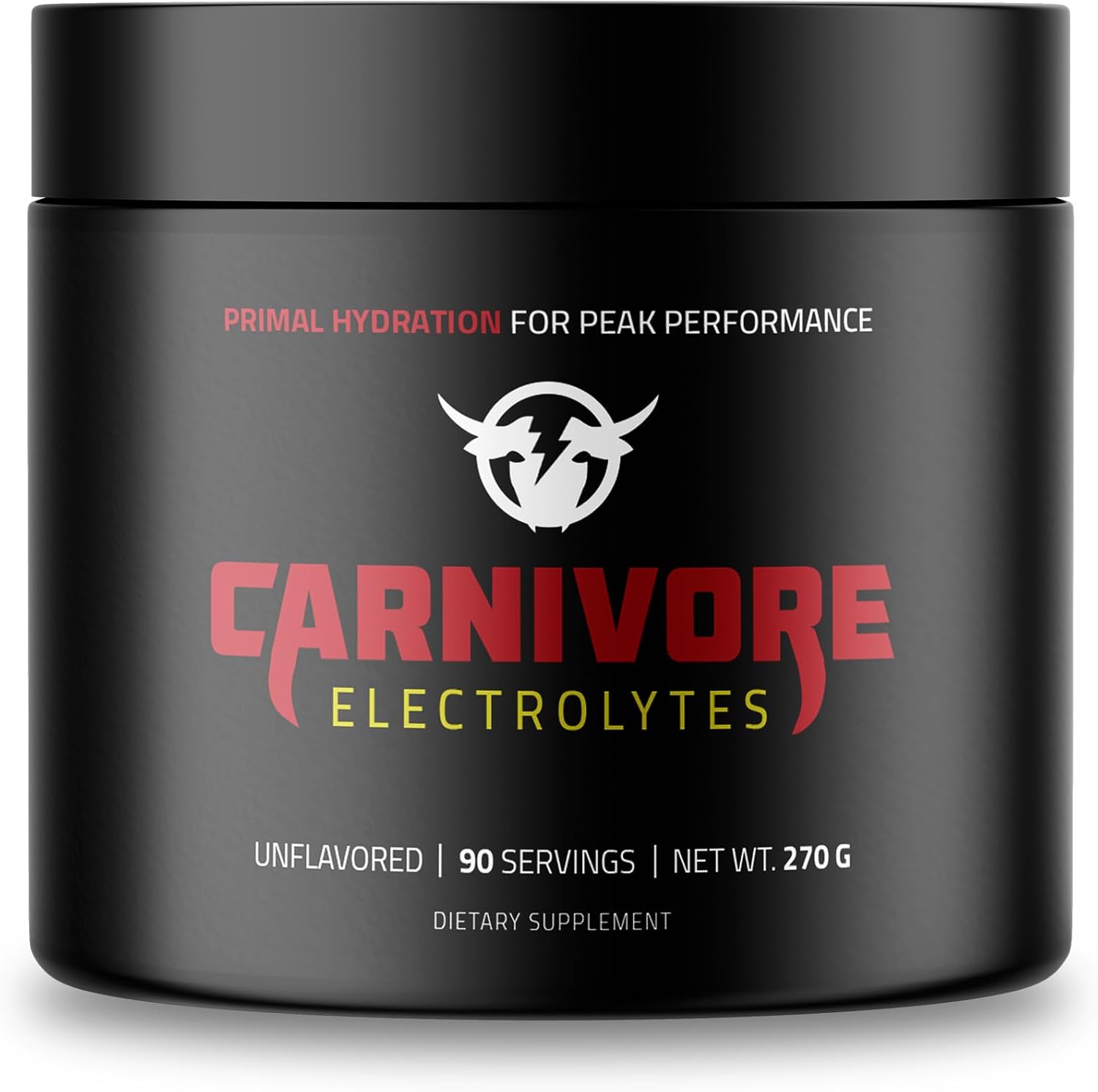Finding the best Electrolytes for a Carnivore Diet should be the first step if you are looking to switch to one. This is the one crucial factor most people overlook when starting a carnivore diet.
When you eliminate carbohydrates from your diet, your body rapidly loses water and essential minerals. So, to make up for this rapid loss, you need a proper electrolyte balance that helps you stay strong, hydrated, and feeling your best on a carnivore diet.
So, in this article, we will explore the best electrolytes for a carnivore diet, including must-have supplements that can help you stay balanced. We will also cover the natural sources of electrolytes if you prefer a whole-food approach. Stay tuned!
Our top Picks For The Best Electrolytes for Carnivore Diet
|
top pick |
Most Popular |
Best Price | |
LMNT Zero Sugar Mixer | Dr. Berg Zero Sugar Hydration | Premium Hydration Powder | |
 |  |  | |
| Sodium | 1,000mg per serving | 1,000 mg per serving | 1,000 mg per serving |
| Special Ingredients | Pink Himalayan Salt | Not specified | Not specified |
| Serving Size | 30 | 50 | 90 |
| Magnesium Content | 60 mg per serving | 45 mg per serving | 45 mg per serving |
| Flavor Options | Three Chocolate Flavours | Comes in 12 Different Flavours | Unflavored |
|
CHECK PRICE
|
CHECK PRICE
|
CHECK PRICE
|
Why Electrolytes Matter On a Carnivore Diet
On a carnivore diet, your carbohydrate intake is reduced to the bare minimum, which might lead to a shortage of insulin. This reduction causes your kidneys to excrete more sodium, which can lead to electrolyte imbalance.
It is important to be mindful of your electrolyte intake to avoid possible shortcomings. The phase of changing to a carnivore diet can lead to what is called “crab flu”, a collection of temporary symptoms like fatigue, headaches, nausea, and irritability.
These symptoms are often caused by electrolyte imbalances and low sodium levels. Ensuring you are consuming sufficient amounts of electrolytes can help control these symptoms and encourage a better lifestyle for you. It simply encourages your body to adapt to a new lifestyle.
Maintaining proper electrolyte levels is essential for those who engage in physical exercises. Electrolytes help to regulate the muscles and keep them in good shape, this is important during workouts or everyday activities. It is crucial to stay hydrated at all times; it helps to replenish electrolytes regularly.
5 Best Electrolytes for Carnivore Diet
1. LMNT

LMNT is a popular electrolyte supplement known for its high sodium content. It provides 1,00 mg of sodium, 200mg of potassium, and 60 mg of magnesium in each serving. This supplement aids in muscle recovery and prevents cramps. LMNT has a balanced mineral profile that supports energy levels and muscle health in general.
2. Dr. Berg's Zero Sugar Hydration Keto Electrolyte Powder

This supplement stands as our Best All-in-One Solution Electrolyte Supplements for Carnivore Diet. It is designed to provide a comprehensive electrolyte blend that features high levels of potassium. It also provides magnesium alongside calcium, chloride, and trace minerals. This formula supports energy production and muscle function. It contains no added sugar or maltodextrin. It’s a perfect supplement if you are on a ketogenic or carnivore lifestyle.
3. Premium Hydration Powder for Carnivore Diet

The premium hydration powder for carnivore diet stands out as the second best on our list of the best electrolyte supplements for carnivore diet. It has a high potassium content, providing 1,000 mg per serving. This is beneficial for muscle repair and supports cardiovascular health. It also contains sodium and magnesium, offering a balanced electrolyte profile. It is sugar, gluten, and artificial ingredients free, making it perfect for a carnivore diet.
4. Liquid I.V. Hydration Multiplier

Liquid I.V. uses what we refer to as cellular transport technology (CTT) to absorb water and other key nutrients rapidly into the bloodstream. This supplement is perfect for those on a carnivorous diet who experience massive water loss and need quick rehydration. You get a substantial does of potassium, glucose, and sodium in one serving.
5. Ultima Replenisher

The Ultima supplements offer an electrolyte profile with all six minerals. It has a sugar and zero-carb formula. Its natural flavor and color are derived from real fruit extracts, which makes it cleaner and enjoyable.
Key Ingredients to Look For in an Electrolyte Supplement
When selecting an electrolyte supplement, consider the following essential minerals:
- Sodium is an essential nutrient, and it is needed by the body to maintain the balance of body fluids and keep muscles and nerves running smoothly and healthy. It helps to conduct nerve impulses, and it also helps to control blood volume and blood pressure.
- Potassium helps to control the heartbeat; it also helps move nutrients into cells and waste products out of cells. It helps to maintain blood pressure. Magnesium is a cofactor of over 300 chemical reactions in the body, including protein synthesis, nerve function, blood glucose control, and blood pressure circulation.
- Chloride helps to regulate the amount of food and nutrients going in and out of the cells; it also maintains pH. Levels and stimulates the stomach acid needed for digestion.
- Phosphate is important for the formation of bones and teeth. It plays a significant role in the release of cell membranes and DNA.
- Calcium is important for bone health, and it builds the muscles. It plays a significant role in the development of teeth. It is also used as a supplement in a dental implant.
Best Natural Sources of Electrolytes for Carnivore Dieters
While most people on a carnivore diet might choose to go with the right supplements, some would like good natural sources. Here are some of the best natural sources of electrolytes;
Bone broth:
This is probably the best nutrient-rich electrolyte source. It is the powerhouse of essential electrolytes, including sodium, potassium, magnesium, and calcium. You can achieve this by bringing animal bones and connective tissues to boil for an extended period. This results in a mineral-rich broth that supports overall health. Bone broth also provides the body with collagen and amino acids that aid digestion and joint health.
Himalayan Salt and Sea Salt:
Himalayan Salt is the best option for sodium, which is vital for maintaining fluid balance, nerve transmission, and muscle function. This salt, alongside unrefined sea salt, is an excellent source of natural sodium and trace minerals. Since they are unprocessed, they retain their mineral content, which aids in replenishing electrolytes.
Organ Meats:
Organ meats are some of the best sources of electrolytes. Meats such as liver, kidney, and heart are very rich in potassium, magnesium, and phosphorus. Including varieties of organ meat in your diet can significantly improve your electrolyte requirements naturally.
Essential Electrolytes for a Carnivore Diet
When following a carnivore diet, it is important to maintain a proper balance in electrolytes to ensure optimal health, energy levels, and overall well-being. When yu=iu are on a carnivore diet, you eliminate most carbs-rich food, and your body tends to retain less water, leading to the natural loss of electrolytes. Here are the most essential electrolytes for a carnivore diet that your body needs and why you should take them;
Sodium
Sodium is the most important electrolyte for those on a carnivore diet; it is found in salt. It is a soft, silvery-white, highly reactive metal that regulates fluid balance, supports nerve function, and helps to maintain blood pressure. Adding a little salt to your meals can help maintain your sodium levels by keeping them balanced.
A decreased level of sodium may lead to dizziness, headaches, and low energy. Adding Himalayan pink salt, Redmond Real Salt, or sea salt to meals is an easy way to replenish sodium naturally. However, it is important to be mindful of the quantity of these products, as some may contain additives that are harmful to the body.
Homemade stock (bone broth) made from simmering animal bones and connective tissue is not only high in collagen but also offers a means of other nutrients.
Potassium
Potassium is a silvery white metal that is soft enough to cut easily with a knife. Fruits and vegetables are common sources of potassium.
Organ meats, such as liver and heart, are rich in this essential mineral. Potassium is crucial for maintaining proper muscle and heart function, and Low potassium levels can cause muscle weakness, fatigue, irregular heartbeats, and painful cramps.
For those who may not enjoy organ meat, the application of seafood variety, beef, salmon, and pork into your diet can help ensure adequate potassium intake. If you still aren’t getting enough potassium, consider an electrolyte supplement with potassium chloride or adding potassium-rich mineral drops to your water.
Magnesium
Magnesium is essential for over 300 biochemical reactions in the body, including muscle recovery, sleep regulation, and nerve function.
Magnesium can also be obtained on a strict carnivore diet. It is required for energy production. Seafood, particularly shellfish like clams and whelk, and grass-fed meats can provide a good amount of magnesium.
Magnesium is important for many processes in the body, including regulating muscles and nerve functions, energy production, blood pressure, and protein. It regulates blood sugar levels. When experiencing symptoms of magnesium deficiency, like muscle cramps, tiredness, or grumpiness,
It may be important to take magnesium-rich foods or supplements, like Magnesium glycinate, citrate, or malate supplements. Mineral water can be a good source of magnesium, so adding those into your hydration routine may help to create balance.
Calcium
Calcium helps build and maintain strong bones, proper muscle contractions, and nerve transmission. While Dairy products like milk, cheese, and yogurt are rich sources of calcium. Many carnivore dieters avoid dairy due to sensitivities.
So, if you are avoiding dairy, bone-in fish like tuna and catfish can provide calcium as well. Bone broth also offers calcium and other nutrients. Calcium generally helps to maintain strong bones and teeth; your heart, muscles, and nerves also need calcium to function properly.
Those who are lactose intolerant should ensure they are getting calcium from alternative sources. The recommended daily intake is 1,000–1,200 mg because without enough calcium, you may experience brittle nails, weak bones, and muscle spasms.
Common Signs Of Electrolyte Imbalance
When you are on a carnivore diet, some common signs of electrolyte imbalance you may experience include fatigue, headache, and vertigo. Should you experience any of these symptoms, it may be time to increase your electrolyte intake. Other signs to watch for could be a fast heartbeat, weakness, headaches, and blood pressure. It is necessary to listen to your body and take note to notice any potential imbalance. If you notice you are experiencing symptoms of electrolyte imbalance, consider consulting a healthcare executive who can help you balance your diet and make other recommendations.
Signs You Need More Electrolytes or Less
There are various forms in which electrolyte imbalance can manifest. Some of the symptoms include;
Deficiency Symptoms: You might experience loss of appetite, constipation, nausea, Headaches, confusion, fatigue, increased thirst, dry skin, muscle cramps, irregular heartbeat, dizziness, and vomiting.
Excess Symptoms: When you have an excess intake, you may experience shortness of breath, rapid heartbeat, dizziness, high blood pressure, and other health complications.
Conclusion
When picking out the Best Electrolytes for a Carnivore Diet, you must maintain proper electrolyte balance as this helps to support hydration, muscle function, nerve signaling, and overall well-being. You source them naturally from bone broth, organ meats, and mineral-rich salts or through high-quality supplements like Liquid IV, LMNT, Ultima, Relyte, and Dr. Berg’s Zero Sugar Hydration Electrolyte Powder.
The whole point is to prevent imbalance, so always make sure that you listen to your body and make changes when needed to ensure you are meeting your electrolyte needs. Ensure you consume enough electrolytes without overloading. This is the best way you can avoid little pitfalls like fatigue, muscle cramps, and dehydration.





